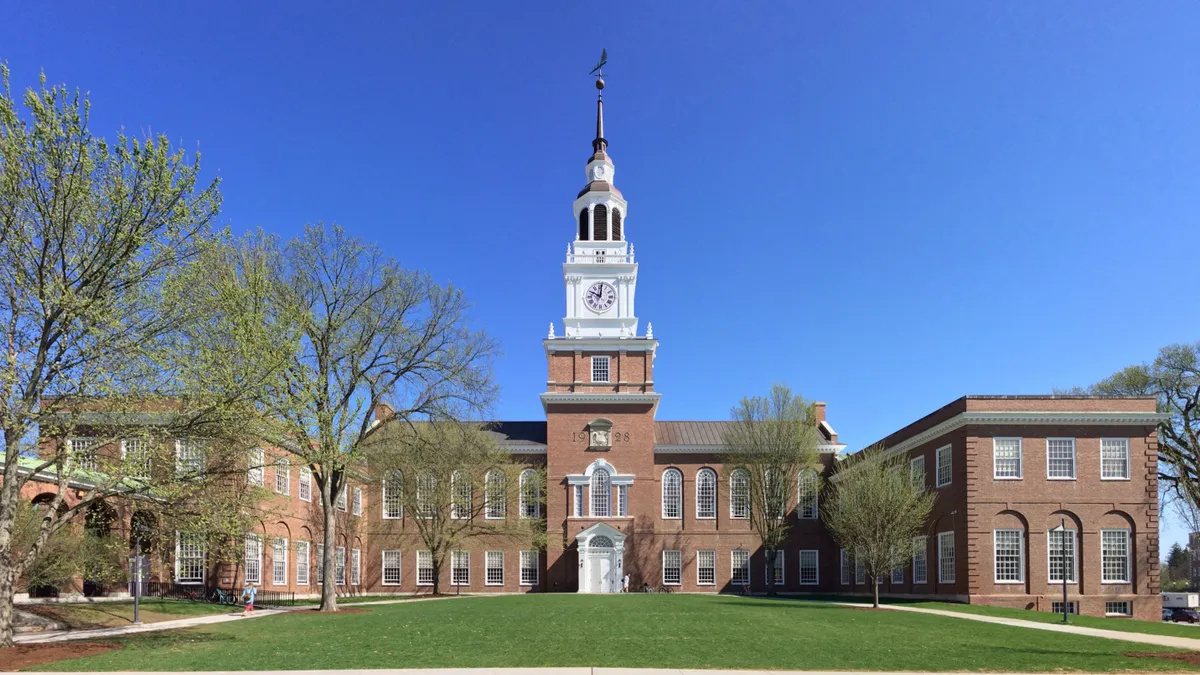Dive Brief:
- Members of Dartmouth College’s men’s basketball team are employees of the university under the National Labor Relations Act and may hold a union representation election, a National Labor Relations Board regional director said in a Feb. 5 decision.
- Laura A. Sacks, regional director for NLRB’s Boston-based Region 01, wrote that because Dartmouth’s basketball players perform work that benefits the university in exchange for compensation — such as equipment, apparel and game tickets — and Dartmouth “exercises significant control over their work,” the players constitute a collective bargaining unit under Section 9(b) of the NLRA.
- Sacks directed the NLRB to conduct a representation election at a future date, although the university may file a request for review with the agency. In an email, a Dartmouth spokesperson told HR Dive that the university will seek review of the decision.
Dive Insight:
Sacks’ decision sets the pick for an unprecedented union election, but the Dartmouth basketball team’s case also reflects a long-running debate about the labor rights of U.S. college athletes.
“This is an historic step forward for economic justice, racial justice, and union rights — not just for college athletes but for millions of young people across our country whose work is not valued like it should be,” Mary Kay Henry, international president of the Service Employees International Union, which seeks to represent the players, said in a press release. “This victory manifests the aspirations of one of the most pro-union generations in American history.”
NLRB previously weighed in on the status of college athletes in 2015, when it declined to assert jurisdiction over a union petition filed by Northwestern University football players and dismissed the petition.
According to Sacks, the board did not explicitly decide whether the Northwestern players were employees, and it declined to exercise jurisdiction in part because Northwestern, a private university, competed in a league — the Big Ten conference — that also included state-run institutions over which it could not assert jurisdiction.
But “nothing in that decision precludes the finding that players at private colleges and universities are employees under the Act,” Sacks wrote, adding that Dartmouth’s men’s basketball team competes in the Ivy League, which consists only of private universities.
Dartmouth’s spokesperson said the university maintained that its basketball players are not employees.
“We are extremely proud of our varsity athletics program for the important values it promotes and the experience it provides for both our athletes and our broader community,” Dartmouth’s spokesperson said. “But it’s important to understand that unlike other institutions where athletics generates millions of dollars in net revenue, the costs of Dartmouth’s athletics program far exceed any revenue from the program — costs that Dartmouth bears as part of our participation in the Ivy League. We also do not compensate our athletes, nor do we provide athletic scholarships; all scholarships are based on financial need.”
Separately, an ongoing case before the 3rd U.S. Circuit Court of Appeals concerns a group of collegiate athletes who alleged that their work for NCAA-member institutions entitled them to minimum-wage protections under state and federal laws. In 2022, several higher education groups and a college accreditor filed an amicus brief in the case opposing the designation of college athletes as employees.













